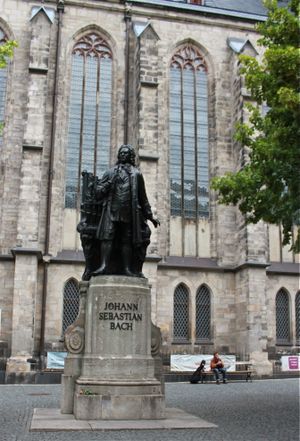Leipzig: Back to Bach
(Photo by Cheryl-Anne Millsap)
The day before I left Spokane and caught an early flight to Germany, the weather was wet and cold. More like late winter than late spring. Everywhere I went people were grumbling about the rain.
“Sorry you have to be out in this,” the usually-cheerful student at the coffee-shop told me. I just shrugged. I’ve given up trying to convince people I don’t mind the rain. There are times, in fact, like when I travel, that I prefer it.
Rain changes the landscape. Especially in a beautiful old city. Colors fade and stone buildings settle into shades of gray like an old black and white photograph. Cobblestones are more pronounced, glossed by the moisture.
When the sun shines we lose our focus. We squint and turn our faces up to the sky. We are tourists, even in our own cities; driven to get out and play. We wilt in the heat and fret about the crowd and the irritations of too many people in tight quarters.
Rainy days set a mood. In the right light, the scene could be set in any time. Old and new blend and blur. It’s easy to imagine things that would, in the bright light of sunshine, be implausible.
I arrived in Leipzig, Germany, the city of Bach and Schumann and Wagner and Mendelssohn, just as an unseasonable rainy spell set in. Skies would pour, then clear, then pour again. Rain fell off and on as I wandered around the city. As they went about their day, people huddled under umbrellas, heads down, until the sun came out again.
Leipzig is the place where Johann Sebastian Bach spent the last 25 years of his life. Where he raised a family and lived his life as both busy academic and musician.
The sun was out when I toured the Bach museum and in a darkened “treasure room” looked down on a cantata written in his own hand. I saw the house where his family’s closest friends lived, the place where the only remaining organ played by Bach is housed. Where a chest decorated with his family crest is on display.
I looked down on his grave - or, what scholars are reasonably certain is his grave - in St. Thomas Church. I studied the statue and all the artifacts, but it wasn’t until the skies clouded again that I felt like had found the man.
In the spell cast by the rain, I could imagine him, worried, distracted, his mind on everyday irritations and ordinary concerns, barreling down the same narrow streets or striding across the square. It wasn’t hard to picture him dodging puddles as he walked, turning over in his mind all the worry and aggravation of work and home, lost in thought, focusing on numbers, budgets, a choir of rowdy boys; juggling the burden of a large family or the purchase of instruments for the orchestra or consumed by the composition of a cantata.
I ducked into one of the small shops looking for chocolates to bring home. The clerk, realizing I was an American, apologized for the weather.
“Yesterday was so much more beautiful,” she told me. “Perhaps tomorrow will be better.”
“Oh, no, today was perfect” I said, taking the shopping bag full of sweet souvenirs for my family back home. “I saw exactly what I was hoping to see.”
Cheryl-Anne Millsap writes for The Spokesman-Review. Her essays can be heard on Spokane Public Radio and on public radio stations across the country. She is the author of “Home Planet: A Life in Four Seasons” and can be reached at catmillsap@gmail.com
